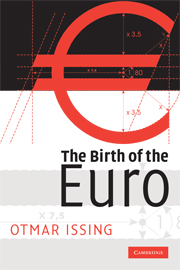6 - Europe at the crossroads
Published online by Cambridge University Press: 29 May 2010
Summary
It undoubtedly required political courage to fix the beginning of monetary union definitively for 1 January 1999. To date, the euro's success has proved the confraternity of ‘economic doubters’ wrong. The single currency has brought the member states monetary stability: internally, with a low rate of inflation; and externally, with the protection the common currency affords against the foreign exchange market repercussions of exogenous shocks that were repeatedly experienced in the past.
The political decision did not, however, remove all justification for the reservations entertained by many economists about a premature start to EMU. The economies of the member states still have some way to go to satisfy the conditions necessary for monetary union to function properly. The political courage at the beginning needs to be complemented by the resolve to pursue the necessary reforms.
Fiscal policy has yet to demonstrate convincingly its full compliance with the self-imposed rules of the Stability and Growth Pact. Confidence in stability is certainly not fostered if, over and over again, governments solemnly promise to follow a sound budgetary policy in the future, as they did for instance in Berlin in the spring of 2007, only to see one or the other distancing themselves from such promises a few months later. And how credible are commitments if, many years after accession to EMU, countries still have debt levels of over 100 per cent of GDP – and that despite the ‘gift’ of markedly lower interest rates associated with entry into EMU?
- Type
- Chapter
- Information
- The Birth of the Euro , pp. 237 - 244Publisher: Cambridge University PressPrint publication year: 2008



